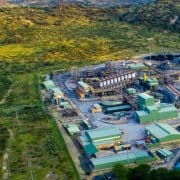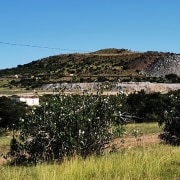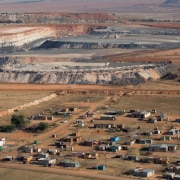|
Getting your Trinity Audio player ready...
|
By Mashudu Masutha
First published on Transparency International Australia
Bapo ba Mogale (Bapo Community) is a traditional community, sitting on incredibly rich platinum deposits in the North West province of South Africa. Mining in the area has a long history, stretching back to 1969 when Lonmin platinum mine opened, now owned by Sibanye Stillwater.
During the apartheid era, the province was governed under the Bantustan legal framework that paved the way for a new form of consultation that was top-down rather than bottom-up, which was the form of engagement in traditional communities and has continued to present day South Africa.
This meant that kings and traditional councils are the first and often only group mining companies meaningfully engaged with – from the licensing phase to the finalisation of social and labour plans, to the conclusion of compensation agreements. Community members remained in the dark about the negotiations and decisions happening behind closed doors, and consultation with them as the people most directly affected by mining rarely, if ever, occurs. This has been the reality for the Bapo community for years.
This practice stands in contrast to the national law, as dictated by the Minerals Petroleum Resources and Development Act (MPRDA), which requires consultation with interested and affected parties throughout the life of a mine. In other words, the MPRDA requires consultation with individuals directly affected by mining operations, not consultation with the traditional authorities. This consultation is primarily done through drafting of social and labour plans (SLPs). These plans are designed to ensure mining companies contribute to the social and economic development of the areas where they operate. However, in trying to exercise participation rights in the implementation of SLP’s, community members that are directly affected by mining operations are confronted by conflicting systems of governance which results in a fundamental corruption vulnerability.
In Bapo for example, as the Sibanye Stillwater business unit operates in Marikana of the Bapo traditional authority, the company has concluded a SLP with the Bapo traditional authorities for the social and economic development of the Marikana people. The legal gymnastics with this creates a significant barrier for communities affected by mining operations to exercise their participation rights, hold mining companies accountable to the SLPs they create, and demand government ensure compliance of SLP commitments.
The Bapo community is a clear example of this policy failure. Despite decades of mining, community members state they still live in extreme poverty, very little development has taken place and concerning levels of unemployment persist. This is partly because SLPs are too often designed without consulting the community. By leaving them out of the consultation, SLPs fail to respond to the actual challenges experienced by people in the community.
The risk of corruption
The top-down system of governance in traditional communities – where mining companies engage directly with kings and traditional councils – has made these leadership positions very lucrative. The corruption reports that Corruption Watch receives from the public strongly suggest that this form of consultation has created a corrupt industry, where it is not uncommon for traditional leaders to receive gifts or other favours in exchange for fast-tracking agreements which would ordinarily need to be approved by interested and affected parties. The reality is that these negotiations happen behind closed doors which creates a risk that the company’s best interest will be prioritised above the community’s best interest.
This traditional governance system presents critical corruption loopholes, especially in communities where mining occurs.
As the Accountable Mining Programme’s global research has found,
- when consultation only occurs with elites who do not necessarily represent the community’s interests, leaders can take advantage of negotiations for their own personal gain.
- When the negotiation process is not transparent, and agreements are not published, it is difficult to detect whether negotiations have been manipulated and hold the decision-makers to account
- If there are no clear or binding requirements for community consultation (or they are not enforced), this opens the door for the duty to consult to be ignored or undertaken superficially.
Political interference
There is a compounding corruption risk in the Bapo community: local government interference in traditional governance processes. Local government is responsible for ensuring accountability and transparency in all traditional governance processes, and it also gazettes and authorises these traditional council positions. However, the local government has refused to legitimise the Bapo traditional king and council and public officials continue to sit as interim administrators for the community.
This has caused infighting and undermined the legitimacy of the traditional positions of the king and council members. While there are limitations in the traditional governance process, the traditional council is the only mechanism through which the local community can engage with the mining company. However, by refusing to authorise Bapo’s traditional king and council, local government officials have impaired the only mechanism that enables the community to voice their concerns and engage in the consultative process. As a result, no engagement or consultation has taken place with the operating mine since 2012.
This has opened the door to serious corruption risks. In 2014 for example, three men claiming to represent the community swapped the 12% annual royalties of the platinum mines for R100 million in cash and R540 million in equity in Lonmin PLC. The transaction was concluded without the consultation required under the law. The terms of the deal were kept secret from just about every member of the 40,000-strong Bapo community.
The level of corruption affecting the Bapo community as a result of governance disputes impacts on the lives of the Bapo from one generation to the next. A community member said that in their opinion “there has not been any benefit to the community while mining activities continue”.
In the community’s view, their problems with consultations would “be solved if the issue of traditional governance is resolved”.
Civil society organisations and community members have called for urgent intervention by oversight bodies. All have requested local government to afford the Bapo community transparency in mining-related processes and authorise legitimate traditional governance actors in the community.
Corruption Watch
Corruption Watch has been involved in supporting the community’s engagements with local government, demanding answers which have not been forthcoming from officials.
We want to see the public release of the Mafereka commission of enquiry report, which determines the traditional governance actors in the Bapo community. Its release would allow for the community’s traditional governance processes to take place. However local government refuses to release it, despite court judgments ordering its release.
Corruption Watch’s key demand is that traditional governance processes be transparent.
Particularly worrying is the recent signing of the Traditional Leadership and Khoi-San Act (TKLA) which allows for kings or chiefs to unilaterally consent to any economic development in their land.
As the story of the Bapo community illustrates, the ability of local government to exert control over traditional governance structures means there is a greater risk that power can be concentrated in the hands of local government officials.
With this new Act in force, public officials can exert influence over community consultation processes within communities. Corruption Watch is party to an upcoming constitutional court challenge of the TKLA in so far as it limits consultation in traditional communities.
Corruption Watch’s approach is also advocacy through media campaigns. Through this approach we aim to raise awareness about the problems of governance in the Bapo community that result in the members of the Bapo Community not being consulted on key issues that affect them. It will encourage the members of the Bapo Community, and other traditional communities affected by the lack of transparency, to participate in holding their local officials to account.








